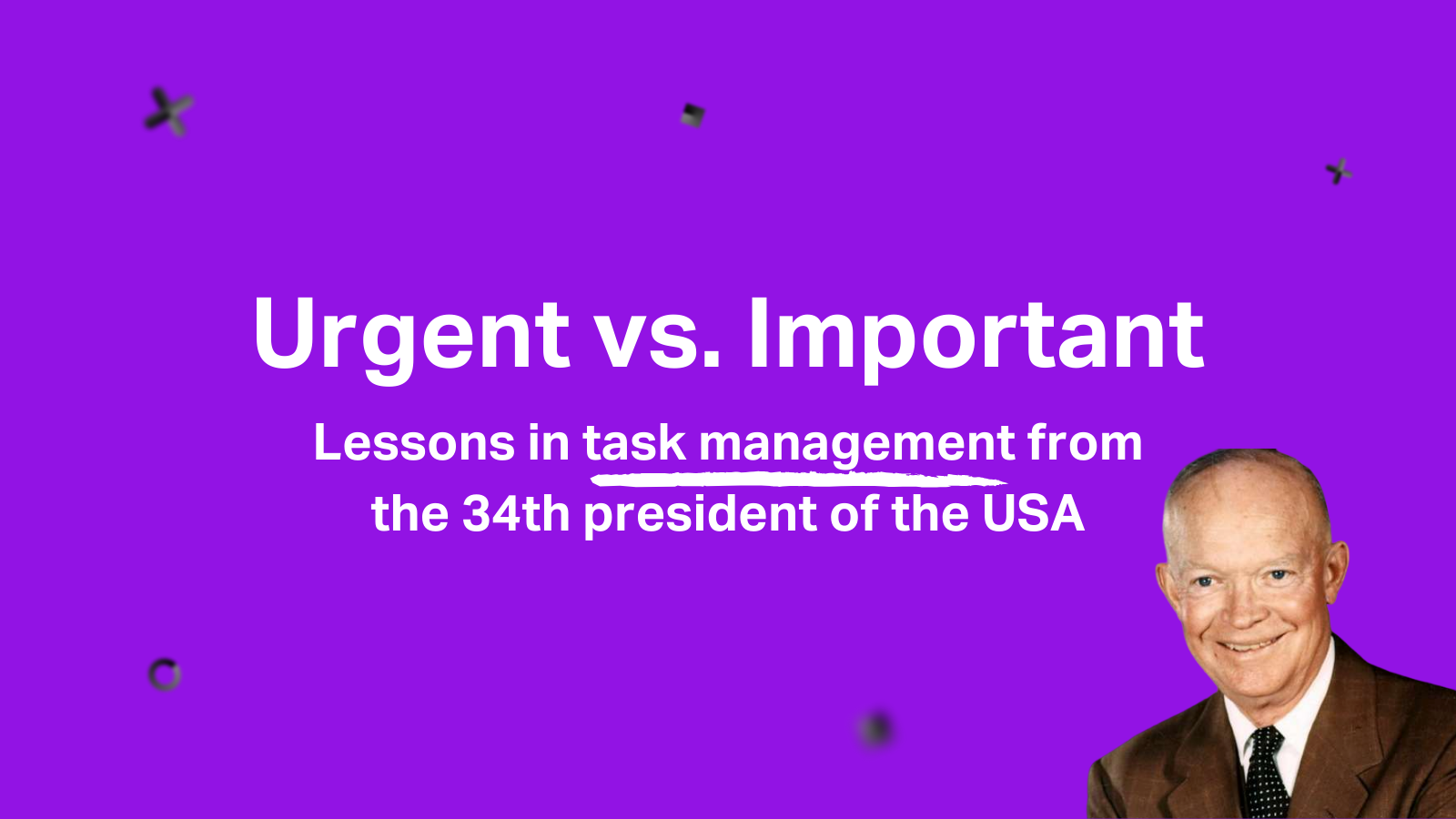Urgent vs. Important - Lessons in task management from the 34th president of the USA - Pixie
Do you find yourself always firefighting? You get to the end of the day feeling drained, tired, and exhausted, and yet you’re not sure whether you truly ac

Do you find yourself always firefighting?
You get to the end of the day feeling drained, tired, and exhausted, and yet you’re not sure whether you truly achieved anything as a result?
Well, if you’re sat nodding your head, then chances are that you’re confusing urgent tasks with important tasks.
But first, let’s introduce the 34th president of the United States, Dwight D. Eisenhower…
“What is important is seldom urgent and what is urgent is seldom important.” - Dwight D. Eisenhower
Dwight D. Eisenhower was a pretty intelligent guy. I mean, he was the president of the USA.
And during his time as a general and president, he came up with the principle of urgent vs. important tasks.
Urgent tasks are the ones that need to be done right now. They make us reactive, and often we’re in such a rush to do them that we approach them with a narrow-focus.
Important tasks are ones that contribute towards improving our life or business long term. Sometimes they’re urgent, other times they’re not. When we focus on these we are often proactive, calm and open-minded.
But there’s a trap we’re all guilty of falling into…
That all urgent tasks are important. In recent times, this has been made worse by social media and the “always-on” culture that many people find themselves in. Because all the notifications we get seem urgent, we end up confusing what’s urgent with what’s actually important.
So, what’s the solution?

This is the Eisenhower decision matrix. It splits tasks into 4 main categories:
- Urgent & Important
- Not urgent & Important
- Urgent & Not important
- Not urgent & Not important
Let’s explore each quadrant in some more detail and find out what you can do to shift your focus from urgent to important…
Quadrant 1: Urgent & Important tasks
Action - Do first!
The quadrant contains tasks that are both urgent & important. These are tasks that need to be completed immediately, and at the same time they hold some importance to your life or business.
Typically, most tasks in this quadrant fall into 3 categories: crises, problems, and deadlines.
Here are a few examples:
- Certain emails or phone calls that need immediate action
- Client deadlines
- A family member ends up in A&E
- A team member calls in sick during a busy period
- You have to pick your child up from school for misbehaving
It’s no surprise that people spend a lot of time in this quadrant, however doing so isn’t the best place to be as it can lead to stress and burnout.

With some planning and organisation, you can reduce the urgency of some of these tasks. Take your client deadlines for example. For something like accounts deadlines, with the right systems, checklists and technology in place, you can deliver these within a few months of the clients year-end, instead of waiting until a few weeks before the deadline is due. Using something like Pixie to plan and track this work in advance can reduce the stress and pressure dramatically.
Quadrant 2: Not urgent & Important tasks
Action - Schedule in advance
In this second quadrant we have tasks that might not have an immediate deadline, but they do hold an importance for your life and/or business. Because these tasks lack urgency, they need to be scheduled into your diary in advance to make sure you set aside the time to focus on them. Otherwise, the reality is that Urgent/Important tasks take over and you never have any time for these.
Typically, these tasks are around improving yourself personally, improving your business, or planning for the future.
Here are a few examples:
- Weekly job planning (or you could have it done automatically in Pixie…)
- Long term goal setting
- Exercise
- Family time
- Time for your personal hobbies
Whilst this is the quadrant we should aim to spend most of our time, the reality is that it’s the place where we tend to spend the least amount of time. One of the main reasons for this is that because when we’re surrounded by urgent and pressing tasks, it’s hard to get motivated to do something that doesn’t have a deadline looming over it. It takes self-discipline and willpower to dedicate time to these things consistently.
If you find yourself saying “I’ll do this someday” then know that “someday” will likely never come. Waiting for your busy schedule to clear up is planning to fail.
Quadrant 3: Urgent & Not important tasks
Action - Delegate
In the third quadrant we have tasks that need immediate attention but don’t contribute towards improving your life or business. They typically consist of interruptions from other people, unnecessary meetings and any other activities that aren’t that important.
Here are a few examples:
- Phone calls
- Emails (although some can be urgent!)
- Team members coming back and putting work back on your desk
- Unannounced visits from people
- Meetings where a quick email or phone call would have sufficed
These tasks need to be delegated to other people. If they’re not important to you, then somebody else can do them. You can easily delegate tasks and emails to team members in Pixie with just one click!
Lots of people spend their time in this quadrant, whilst thinking they’re in quadrant one. The tasks seem important (because they’re urgent), but the reality is they don’t help to contribute towards your goals.
Quadrant 4: Not urgent & Not important tasks
Action - Don’t do!
The fourth and final quadrant consists of tasks that are neither urgent nor important. They consist mostly of time wasting activities and distractions that you need to stop doing immediately.
Here are a few examples:
- Scrolling through social media (without a purpose)
- Surfing the web
- Playing games (we know some of you are really playing minesweeper!)
Most people would be surprised how much time they spend in this quadrant, and the time that you save here could be invested into quadrant two which consists of important tasks that improve your life and business.
Do you need to shift your focus?
So as you can see, the tasks we do can fall into 4 main quadrants:
Urgent & Important
- Not urgent & Important
- Urgent & Not important
- Not urgent & Not important
Do you know how much time you’re currently spending in each quadrant? For the next week, try and make a note of where your time is spent, you might be surprised by the results.
From there, it’s a case of scheduling and prioritising tasks from Q2, delegating some of the tasks from Q3, and trying to minimise the time you spend in Q4.
If you’re wondering how to do this, then this is exactly what Pixie helps accounting & bookkeeping firm owners to achieve. With our automatic email sync, task management, task delegation and much more, you can easily take control of your workload and move from feeling chaotic to feeling calm. You can find out more here.

About the author
Celso Pinto
A Portuguese expat in London, Celso founded Pixie after learning first-hand about the challenges faced by small accountancy and bookkeeping practices. A product-focused leader with over 20 years experience in the software industry, at Pixie you'll frequently find him listening to customers and distilling their feedback into the product and go-to-market strategy.


